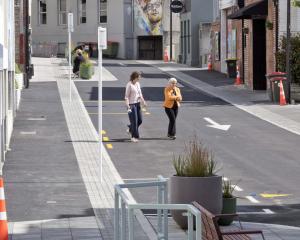However, the New Zealand Law Society has cautioned the Ministry of Justice about pursuing expediency too far.
In the eight months to December 2013, the average age of district court cases in Dunedin reduced by 18.1%.
This included a 24.3% reduction (22 days) in criminal case ages and a 23% reduction (27 days) in family court cases, which are now disposed of in half the national average time.
These results were ahead of the nationwide performance of district courts, where the average age of cases reduced by 9%, or 18 days, by the end of last year, figures showed.
''The Dunedin results are particularly outstanding, which is why we've been referring to the Dunedin District Court as our 2013 court of the year,'' Mr Borrows said.
Improvements began last year when the ministry reorganised district courts and introduced a new management structure.
The new structure focused on delivering better service, which led to the ministry setting a goal of halving the time it takes to deliver court services by 2017.
''This reorganisation has helped to drive changes in processes to make things faster, such as the centralisation of administration for Disputes Tribunal applications, and a new system to speed the processing of urgent protection orders in the Family Court,'' Mr Borrows said.
''That is why the Government passed the Criminal Procedure Act, which made some of the biggest changes to the courts in 50 years.
''The Act is designed to simplify, streamline and speed up court services, and to benefit the people who are involved in the criminal justice system through no fault of their own.''
Mr Borrows said the Act allowed the ministry to trial new ways of doing things, such as empowering police to file charges electronically, rather than having to deliver them to the courts by hand.
''Embracing new technology has also been extended to Corrections, who can now file pre-sentence reports electronically, and bring prisoners and defendants to court electronically via audio-visual links.
''All of these components work together to help improve the court system - to help people get out of the system and get on with their lives faster.
''I'm pleased to say these changes are already starting to pay off in places like Dunedin, even with the building challenges they faced last year.
''We still have real challenges with delays in our court system, but I want to congratulate the Dunedin court staff, and court staff across the country, for the way they have delivered this step-change in the way our court system works.''
While New Zealand Law Society Otago branch president Gerard De Courcy, of Downie Stewart Lawyers, said the branch was pleased waiting times had been reduced, he cautioned the ministry about pushing its bid for efficiency too far.
''Expediency must not be allowed to impact on the quality of the judicial process.
''A poor process can impact on the quality of the outcomes and the perception of the justice system by the public.''
Mr De Courcy said the use of technology had played a significant role in improving the efficiencies of the court, and the legal profession looked forward to working closely with the ministry in the increasing use of technology.
''It is also important to note that the reductions in waiting time have come about through the co-operation of the profession, judiciary and court staff.''
The public and those in the law profession were well served by the ''experienced and dedicated'' court staff in Dunedin, he said.
Key results (at end of 2013)
• 9% (18 days) decrease in the average age of district court cases nationally.
• 100 days decrease in the average time to process plan appeals in Environment Court.
• 13% reduction in the age of all Environment Court cases.
• 39.5% (114) reduction in the age of natural death cases.
Maori Land Court
• 5.4% total reduction in the age of all Maori Land Court cases.
• 15% (11 days) reduction in the age of Disputes Tribunal cases.












